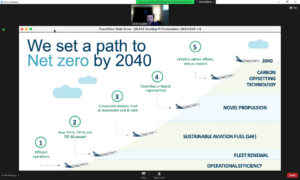By Theo Leggett Business correspondent, BBC News In a windswept corner of a military site on Salisbury Plain a small aircraft jet engine is undergoing tests that could one day lead to huge changes within the aviation industry. The engine itself is almost completely conventional. It is a Rolls-Royce AE-2100A gas turbine, a design used
StART Presentation Delta Path to Net zero 2040 2022-10-26

A behind-the-scenes look at Boeing’s shifting leadership landscape — and its profound effects
Dec. 12, 2021 at 7:00 am Updated Dec. 13, 2021 at 5:34 pm 1 of 15 | Sections of a Dreamliner were delivered from Japan to Everett. These wings were from a plant in Nagoya, Japan. (Mike Siegel / The Seattle Times, 2007) By Peter Robison Editor’s note: This is an edited excerpt from the new book “Flying
More vaccinated travelers mean pricier hotels, flights
Now, with COVID-19 vaccinations opening the possibility of travel to millions more Americans each week, air prices are once again set to change…. (David Zalubowski / The Associated Press) More SAM KEMMIS of NerdWallet The Associated Press The cost of travel will slowly rebound from historic lows as more people receive COVID-19 vaccinations and book long-deferred
Ground the Planes
Donald G. McNeil Jr. What may be the most effective way to stop huge surges in infections during a pandemic? Ground the planes. Just do it. Tell the airlines: “No. You’re not booking hundreds of extra flights to Florida this week.” I wish I’d written this a month ago, because now it’s too late to
Industry Outlook: Commercial Aviation Post Pandemic
The COVID-19 pandemic has led to a significant reduction in passenger traffic, negatively impacting demand for new aircraft and utilization rates of the existing fleet. These trends have significantly affected aircraft orders and deliveries, which directly impact commercial aerospace original equipment manufacturers’ (OEMs’) topline and the extended supply chain. Also, lower utilization rates resulted in
United’s 100% Green Commitment: Reducing our Greenhouse Gas Emissions 100% by 2050
Scott Kirby The COVID-19 pandemic has disrupted the world in many ways. For the airline industry, it has been the most punishing financial blow in our history. Despite the continuing challenges, we at United Airlines have dedicated ourselves every step of the way to make flying as safe as we can, and we always will.
What Is Reverse Thrust?
Reverse thrust, also known as thrust reversal, involves diverting the thrust of an aircraft’s engines to decelerate the plane. When reverse thrust is active, it changes the direction of airflow emanating from the engine to help slow the aircraft down. How does reverse thrust work? When an aircraft is in operation, its engines provide forward
How a 1940s treaty set airlines on a path to high emissions and low regulation
Before the pandemic, aviation was on course to be the UK’s most polluting sector and produce as much as 22% of global emissions by 2050. The industry is suffering from low demand due to coronavirus restrictions, but without meaningful policy changes, flight numbers and emissions are expected to return to pre-COVID-19 levels by 2024. When accounting for emissions, aviation is
Americans are flying much less during the pandemic. Will airlines survive?
U.S. airlines are sending out warnings about huge financial losses and urgently requesting help. Tens of thousands of flights for the fall have been canceled, and change fees have been eliminated in order to attract travelers. Meanwhile, flight staff and security are being drawn into arguments with passengers who refuse to comply with mask mandates.